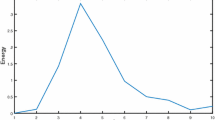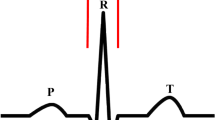Abstract
An ECG signal, generally filled with noise, when de-noised, enables a physician to effectively determine and predict the condition and health of the heart. This paper aims to address the issue of denoising a noisy ECG signal using the Fast Fourier Transform based bandpass filter. Multi-stage adaptive peak detection is then applied to identify the R-peak in the QRS complex of the ECG signal. The result of test simulations using the MIT/BIH Arrhythmia database shows high sensitivity and positive predictivity (PP) of 99.98 and 99.96% respectively, confirming the accuracy and reliability of proposed algorithm for detecting R-peaks in the ECG signal.





Similar content being viewed by others
References
Alwan A. Global status report on noncommunicable diseases 2010. Geneva: World Health Organization; 2011.
Dilaveris PE, et al. Simple electrocardiographic markers for the prediction of paroxysmal idiopathic atrial fibrillation. Am Heart J. 1998;135:733–8.
Webster JG, editor. Medical instrumentation application, and design. Boston: Houghton Mifflin; 1978.
Elgendi M, Mohamed A, Ward R. Efficient ECG compression and QRS detection for E-health applications. Sci Rep. 2017;7(459):1–16.
Calhoun BH, et al. Body sensor networks: a holistic approach from silicon to users. Proc IEEE. 2012;100:91–106.
Luo K, Li J, Wu J. A dynamic compression scheme for energy-efficient real-time wireless electrocardiogram biosensors. IEEE Trans Instrum Meas. 2014;63:2160–9.
Deepu CJ, Lian Y. A joint QRS detection and data compression scheme for wearable sensors. IEEE Trans Biomed Eng. 2015;62:165–75.
https://physionet.org/cgi-bin/atm/ATM. Accessed 14 Oct 2018.
Friesen GM, Jannett TC, Jadallah MA, Yates SL, Quint SR, Nagle HT. A comparison of the noise sensitivity of nine QRS detection algorithms. IEEE Trans Biomed Eng. 1990;37:85–98.
Pan J, Tompkins WJ. A real-time QRS detection algorithm. IEEE Trans Biomed Eng. 1985;32(3):230–6.
Merah M, Abdelmalik TA, Larbi BH. R-peak detection based on stationary wavelet transform. Comput Methods Progr Biomed. 2015;121(3):149–60.
Min YJ, Kim HK, Kang YR, Kim GS, Park J, Kim SW. Design of wavelet-based ECG detector for implantable cardiac pacemakers. IEEE Trans Biomed Circuits Syst. 2013;7(4):426–36.
Kumar A, Komaragiri R, Kumar M. From pacemaker to wearable: techniques for ECG detection systems. J Med Syst. 2018;42(2):34.
Kumar A, Kumar M, Komaragiri R. Design of a biorthogonal wavelet transform based R-peak detection and data compression scheme for implantable cardiac pacemaker systems. J Med Syst. 2018;42(6):102.
Kumar A, Komaragiri R, Kumar M. Heart rate monitoring and therapeutic devices: a wavelet transform based approach for the modeling and classification of congestive heart failure. ISA transactions. 2018.
Kumar A, Komaragiri R, Kumar M. Design of wavelet transform based electrocardiogram monitoring system. ISA transactions, 2018.
Ieong C-I, et al. A 0.83-μW QRS detection processor using quadratic spline wavelet transform for wireless ECG acquisition in 0.35-μM CMOS. IEEE Trans Biomed Circuits Syst. 2012;6(6):586–95.
Thakor NV, Webster JG, Tompkins WJ. Estimation of QRS complex power spectra for design of a QRS filter. IEEE Trans Biomed Eng. 1984;31(11):702–6.
Ferdi Y, Herbeuval JP, Charef A, Boucheham B. R wave detection using fractional digital differentiation. ITBMRBM. 2003;24(5):273–80.
Poli R, Cagnoni S, Valli G. Genetic design of optimum linear and nonlinear QRS detectors. IEEE Trans Biomed Eng. 1995;42(11):1137–41.
Chen HC, et al. A moving average based filtering system with its application to real-time QRS detection.In: Computers in cardiology, 2003.
Kohler B-U, Hennig C, Orglmeister R. The principles of software QRS detection. IEEE Eng Med Biol Mag. 2002;21(1):42–57.
Martínez JP, et al. A wavelet-based ECG delineator: evaluation on standard databases. IEEE Trans Biomed Eng. 2004;51(4):570–81.
Moody GB, Mark RG. The impact of the MIT-BIH arrhythmia database. IEEE Eng Med Biol Mag. 2001;20(3):45–50.
Chua E, Fang W. Mixed bio-signal lossless data compressor for portable brain-heart monitoring systems. IEEE Trans Consum Electron. 2011;57(1):267–73.
Deepu CJ, et al. A 3-lead ECG-on-chip with QRS detection and lossless compression for wireless sensors. IEEE Trans Circuits Syst II Exp Briefs. 2016;63(12):1151–5.
Arnavut Z. ECG signal compression based on burrows-wheeler transformation and inversion ranks of linear prediction. IEEE Trans Biomed Eng. 2007;54(3):410–8.
Miaou S-G, Chao S-N. Wavelet-based lossy-to-lossless ECG compression in a unified vector quantization framework. IEEE Trans Biomed Eng. 2005;52(3):539–43.
Chen S-L, Wang J-G. VLSI implementation of low-power cost efficient lossless ECG encoder design for wireless healthcare monitoring application. Electron Lett. 2013;49(2):91–3.
Author information
Authors and Affiliations
Corresponding author
Ethics declarations
Conflict of interest
Authors Ashish Kumar, Rama Komaragiri and Manjeet Kumar declares that they have no conflict of interest.
Ethical approval
This article does not contain any studies with human participants or animals performed by any of the authors.
Rights and permissions
About this article
Cite this article
Kumar, A., Ranganatham, R., Komaragiri, R. et al. Efficient QRS complex detection algorithm based on Fast Fourier Transform. Biomed. Eng. Lett. 9, 145–151 (2019). https://doi.org/10.1007/s13534-018-0087-y
Received:
Revised:
Accepted:
Published:
Issue Date:
DOI: https://doi.org/10.1007/s13534-018-0087-y




